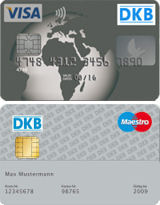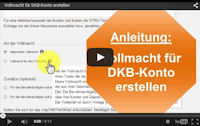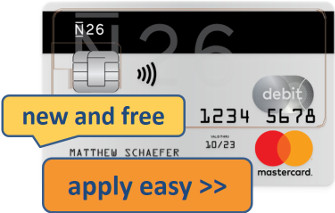Bank Mandate ready in 5 minutes
What if you or your partner (or children/parents) got involved in a terrible accident?
Of course! There are a thousand things to do … and one of them (usually a little later) is the bank account.
All other problems can be huge, but you cannot evade the bank account.
The worst scenario is that the bank contacts you with a message on the chargeback of a SEPA direct debit, because the funds in the account were not enough.
What can you do now?
- You do not know the account balance!
- The bank won´t provide information (because it is not allowed out of legal reasons)!
- If it is the opposite case that there is a lot of money on the account, which you need urgently, the bank won´t pay it (because it is not allowed out of legal reasons)!
This is a sh…t situation!
A practical – but illegal emergency solution – would be to log into the online banking of the injured and make the necessary payments. However, this will get you in hot water (criminal offense).
Nevertheless, if you do not know the online password for Internet banking or cannot confirm the transaction via TAN, this last resort does not help you either.
Solution: Grant the bank mandate
The solution is so simple that many do not do it, but they regret it afterwards and confront huge problems.
I remember a case in which a German citizen died at the doors of a hospital in Latin America, because the payment of the treatment was not carried out in advance.
Okay, who mainly resides in Germany knows that hospitals here are committed to perform emergency treatments, regardless of the funding. Instead, there are debt collection agencies, court bailiffs, garnishments and all sorts of other reprisals for defaulters.
Yes, one can become a defaulter relatively unindebted, if one is accidentally not able to pay the bills.
Even worse: The loved ones will be hit hard by the consequences, because they cannot access the money on the account of the principal earner!
Be responsible – take precautions!
The precaution is so simple. Read on first, then think about it and the practical implementation will only cost you 5 minutes of your life. However, it will save hours, if not days or weeks, of suffering.
As many readers of this special portal for smart bank customers have an account at the DKB, I have recorded the guide for setting up a bank account or bank mandate using the example of the DKB:
How to set up a bank mandate at the DKB account:
(Video currently with German voiceover)
Do you think that you can manage the set up too?
Who is eligible for the bank mandate?
By law, you can grant anyone with the bank mandate, even an employee of the bank. This, of course, makes sense only if you have a special relationship of trust.
In any case, confidence plays a big role, because the authorized person is allowed to make payments, withdraw cash, buy or sell securities and deposits in your name.
However, the authorized person is not allowed to do things in his/her name. For example, he/she cannot pay an invoice, drawn up in his/her name – unless you agree. Then, it is carried out in your name.
This is legal squabbling. What is possible technically, will be carried out technically.
A joint account would be an alternative to the single account with bank mandate. Here, the second person is not an authorized person, but the
Let´s get back to the account and bank mandate.
Limitation of authorizations
Individual specifications, as you might know them from a living will or the last will, can only hardly be set up at banks.
However, one can define categories. Therefore, the DKB distinguishes between a general authorization and an account authorization in the event of death.
The difference: In the first case, the authorized person may dispose of the account in your name at any time, and in the second case, only if the official death certificate has been submitted to the bank.
In an accident like in our example, the general authorization would be necessary.
Online banking, debit and credit card for authorized persons
If one only sets up a bank mandate without access to online banking or payment cards, this is also a limitation. The authorized person may only communicate by telephone or in writing with the bank. And at the DKB, orders assigned by phone will not be accepted out of security reasons (except card blockings).
Depending on the trust and relationship, it may make sense to extend the bank mandate with access to the Internet banking and bank cards.

DKB cards for authorized persons (optional, but free of charge)
The following options exist at the DKB:
- separate access to the online banking for the authorized person,
- V Pay Card (former EC-card) for the authorized person,
- Visa card for the authorized person.
You can equip the authorized person in a way that he/she can act just as comfortable as the actual account holder.
Bank mandates and therefore also Internet access and bank cards can be set up for more than one person.
Security for you as the account holder
Granted bank mandates can always be viewed, modified or deleted in the online banking system. Make use of it, if the relationship of trust should change.
Yes, this does happen too and is colloquially known by the term account plundering. Common event: “Just before she broke up, she plundered his account with the bank card and disappeared forever.” Okay, this is the downside of such bank mandates. I will not conceal this. Although such behaviour is a criminal offense, but it has to be proven and determined by a court first and the other person has to be available and capable of the payback. That is why you should think twice about who you grant with an account mandate. Eligible are people particularly frequently of these groups of persons: Advice: Check annually, if your authorized person still has the appropriate relationship! Questions on the bank mandate?
Further interesting subjects:
PS: If you are not yet a DKB customer, then please have a look here: DKB Cash with Visa credit card – free of charge! (this is perhaps worth considering, isn´t it?)













Leave a Reply